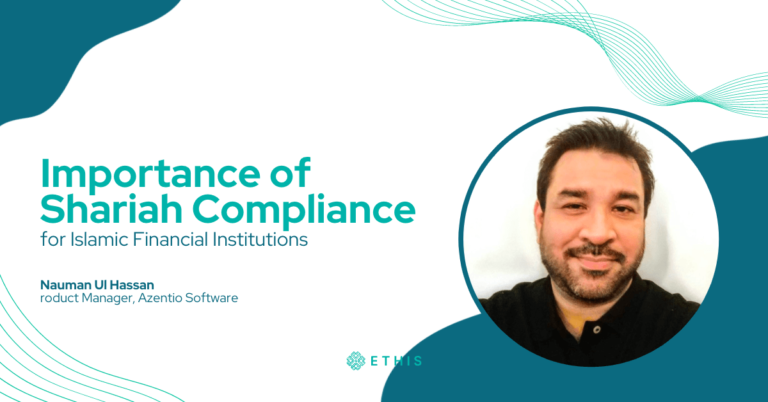
An Interview with Nauman Ul Hassan, Product Manager, Azentio Software
Q: How important is Shariah compliance for an Islamic financial institution?
A: One of the major risks an Islamic financial institution carries is Reputational Risk. The customers place their trust in the institution expecting returns are being generated in a Shariah-compliant manner. From an institution perspective, any noncompliance identified results in loss of profit since the income generated from a transaction violating the core of Shariah once identified is given away as charity. A minor mistake in the execution of the contract can make the transaction completely impermissible.
Q: Do we have standard rules that are followed across the globe for Shariah Compliance?
A: Every geographical area has its own set of regulations which guide the Islamic financial institutions, although some practices may differ in certain regions, and each practice has to be approved by the respective Shariah scholars. In this regard, the standardisation of processes is already under development. AAOIFI has emerged as a global entity which has issued Shariah and accounting standards after a rigorous process of evaluation of each standard by multiple scholars.
Q: As a Shariah-compliant software provider what do you foresee in the future?


A: At the current pace of growth, the Islamic finance industry would not be able to cope with Shariah compliance requirements keeping in view the shortage of qualified resources and the associated costs. The operational cost of running an Islamic financial institution is high due to the transactional nature where a contract has to be executed at the right event and in the right sequence. With the growth of an institution, the need for human resources also increases and it will become inevitable for a bank to automate its operations to reduce its dependency on human involvement and interventions.



Q: What role can an IT system play to ensure Shariah compliance?
A: The systems should be capable enough to support the Islamic contracts from inception till payoff and profit distribution. The key challenge a Shariah team faces is validating the correct execution sequence of a contract. The standard conventional banking systems are designed to lend money and are unable to capture the transactional sequence of an Islamic contract. Therefore the compliance department has to rely solely on the supportive documents which, being totally manual can be manipulated.
For example, to reduce efforts a staff can get both the offer and acceptance of a Murabahah contract signed off simultaneously from the customer and later on he mentions the date. Such practices may not get detected by the compliance department and they may need additional validation to ensure compliance.
However, if the same transaction is executed within the system with a proper sequence of events it would become almost impossible to manipulate the record. On the other hand, the Shariah compliance department will also save its resources with strict online access to the executed transactions reducing the overall costs and mainly the cost of travelling and branch visits.
Q: What are the challenges you foresee in the future for the overall Islamic finance industry?


The world is moving quickly to digital channels from the traditional brick and mortar branches. Digital technologies such as data pooling, AI and online banking have enthusiastically been adopted by the industry to address the challenges brought about by COVID-19. We can’t deny though that there are still users who are sceptic about using digital technology to manage their finances but eventually things will move completely to the digital ecosystem.
The Islamic finance industry, keeping in view its unique operational processes, should start investing in human capital who will have both the technological and Shariah knowledge so that customers do not miss out on these advancements. The Islamic finance industry would also have to consider budgetary allocations for investments in new-age technologies if it wants to be on par and compete with the global fintech.





Top Posts
Islamic P2P Crowdfunding Explained
Halal Money Matters: How Muslims Can Balance Deen and Dunya with Smart Islamic Finance
Halal Investments for Singapore Muslims? It’s time for a shake-up in the Islamic Investments scene.
Smart investment for making Halal money
3 Reasons Why Property Crowdfunding is the Smart Investment for You